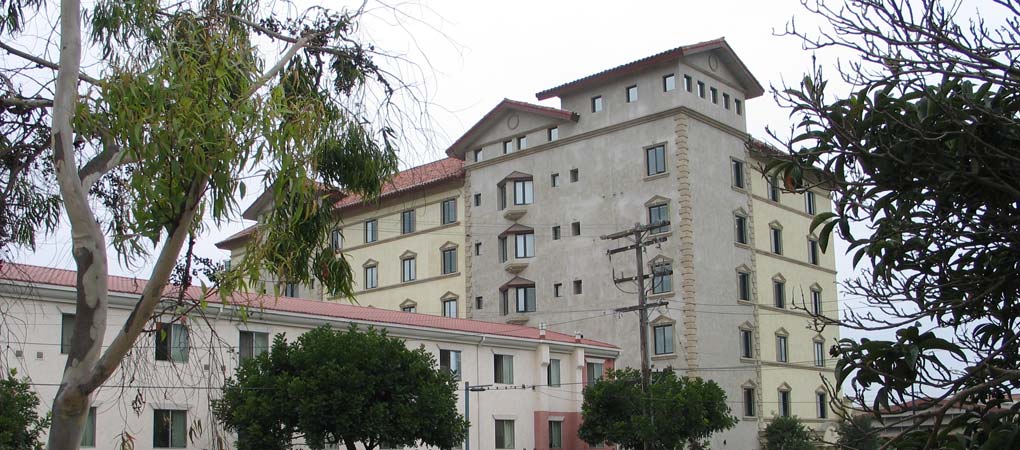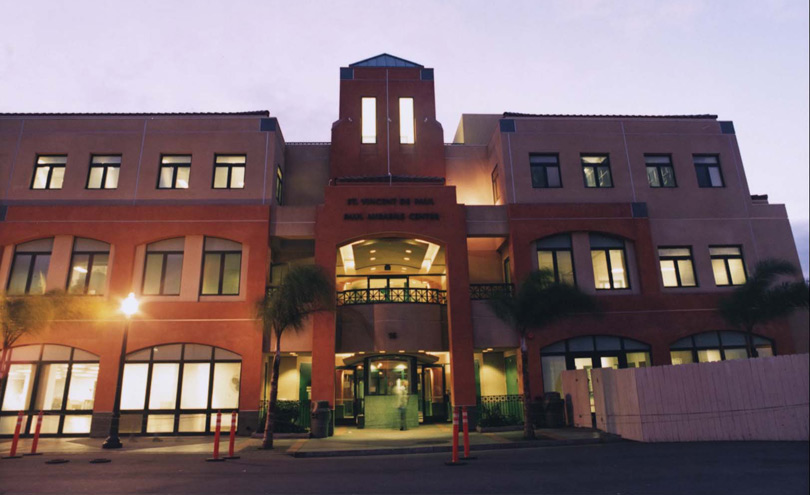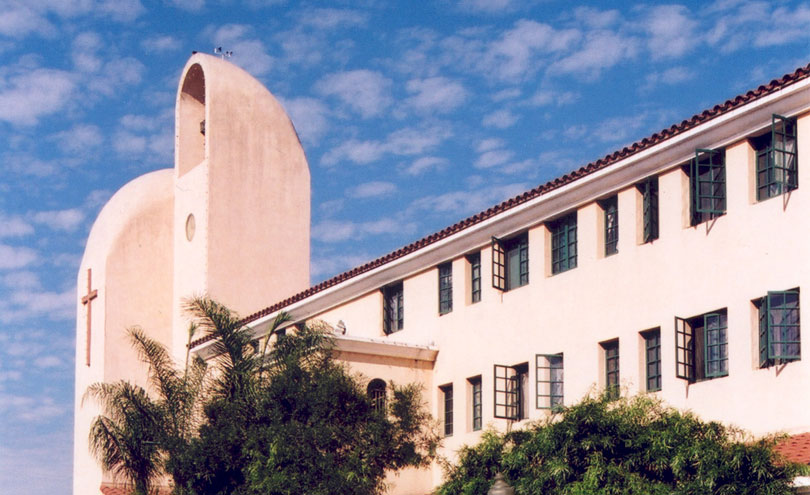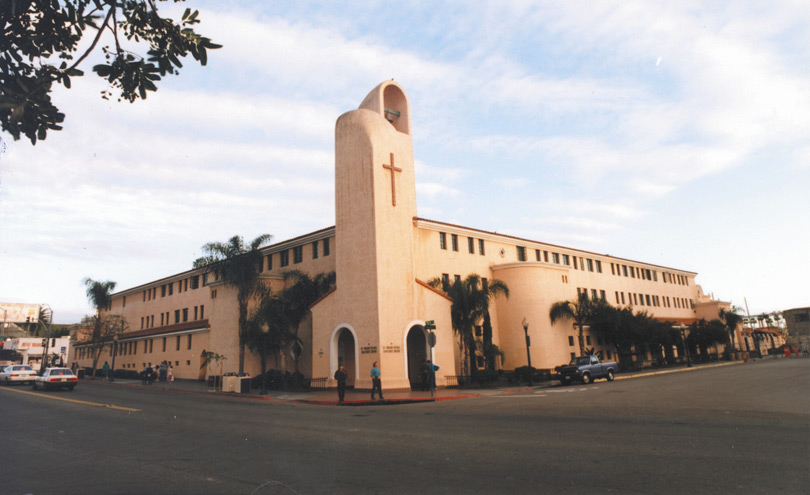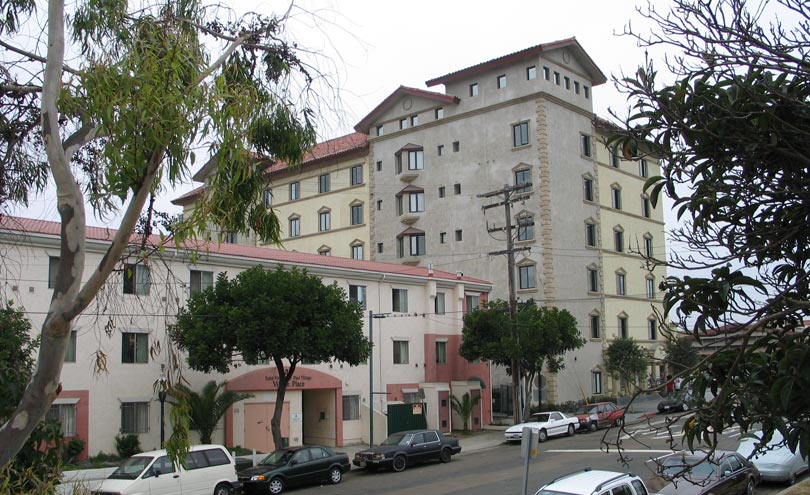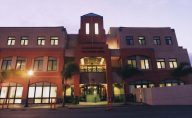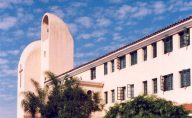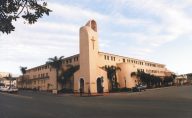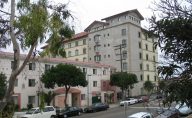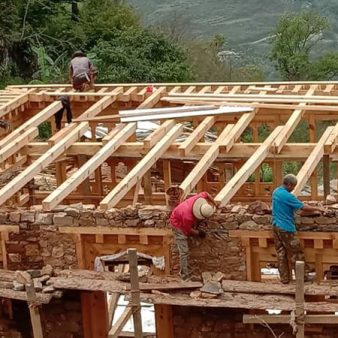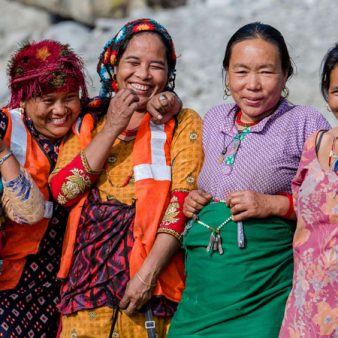St. Vincent de Paul Village is currently the largest residential homeless services agency providing 46 per cent of all transitional housing beds in the City of San Diego on a nightly basis, according to 2004 San Diego City Consortium data for the HUD Continuum of Care application. To date, the organization has constructed and rehabilitated over 350,000 square feet of residential space, incorporating an on-site community medical and dental clinic, elementary and high school, day care, dining facility, career and education center, and additional services for residential clients, and local community members. The St. Vincent de Paul Village campus is now equipped with over 870 transitional housing beds, as well as 136 permanent housing units. Campus sites include: Paul Mirabile Center, Joan Kroc Center (recognized by World Habitat in 1988), Bishop Maher Center, National AIDS Foundation/Josue Homes, Village Place, Villa Harvey Mandel and Toussaint Academy.
Village Place and Villa Harvey Mandel are two of the newest facilities, providing much-needed 136 permanent housing units for low-income persons, many of whom have special needs and disabilities. Village Place is a three-story apartment building with 46 units, rehabilitated in 1997 from a reputed drug den. In May 2003, Villa Harvey Mandel opened with 90 units for low-income and special needs residents. Thirty-three of the permanent units are designated Shelter + Care, which is a service-enriched, affordable housing program for formerly homeless single adults with disabilities. Additionally, 25 beds at Villa Mandel are set aside for persons who have mental illness or chemical dependency issues.
The Toussaint Academy of the Arts and Sciences was established in 1998 and provides long-term stable housing for homeless teens. The 40,000 square foot four-story building contains classrooms, dormitories for 30 students, a dining hall, computer lab, recreation room, multi-purpose room, exercise room and administrative offices. Toussaint Academy provides a continuum of supportive services that assist homeless teens on their journey to independence and success. Services include an on-site high school, life skills instruction, job training and placement, and wellness and enrichment services. The students who live at Toussaint Academy are assigned to Resident Assistants who provide what teens would receive in a healthy home environment: supervision, life skills coaching, mentoring, warmth, and support. Students also participate in a variety of classes and activities focusing on the acquisition of life skills such as money management, cooking, job skills, social skills, healthy relationships, anger management and more.
The variety of support services offered free of charge to all transitional and permanent housing clients include:
- Case Management: Case Managers provide individual support, advocacy, and assessment for clients. They encourage socialization and plan group activities.
- Clinical Services: Consists of three critical programs: The Assessment Center: Here, a number of standardized assessments are given to ascertain an individual’s level of education, health, vocational abilities, mental health and more; Substance Abuse Recovery Services: On-site AA meetings and NA meetings; chemical dependency education; process, re-entry and relapse prevention groups; Mental Health Services: Crisis intervention; individual therapy; a full range of neuropsychological and psycho-educational testing; group therapy on topics such as grief and loss, cognitive remediation, problem solving, coping with depression, anger management.
- Career and Education Center (CEC): Employment preparation and career development assistance. Adult Basic Education, English as a Second Language, and Computer Skills Classes.
- Health Care Services: Medical, dental, and psychiatric diagnosis and treatment.
- Chaplaincy Programme: Spiritual counselling, retreats and voluntary religious services.
- Children’s Services: Providing over 200 resident children with education, self-worth, social skills and sense of security.
- Meal Program: Provides daily meals- breakfast, lunch and dinner- to more than 900 residents and a midday meal on daily basis for up to 2,000 non-residents with the assistance of our partner organizations and thousands of volunteers.
The timeline below chronicles St. Vincent de Paul’s history in providing housing and services for the homeless:
1950: Catholic Diocese of San Diego established a soup kitchen to serve those in need.
1950-1983: St. Vincent de Paul Village grew into a traditional social service outreach centre offering noonday meals, clothing distribution, and thrift store operations to homeless single men.
1983: Co-founded SHARE – food co-op and self-help/resource exchange to feed families and individuals in need while involving them in the betterment of the community; opened temporary shelter of 150 beds at the El Cortez/Travelator Motel.
1984: Commenced fundraising and architectural plans for a new shelter at 1501 Imperial Avenue.
1987: Opened Joan Kroc Centre – Three hundred and thirteen beds, on-site school, health clinic, day centre, dining room, child care center and employment resource center establishing the continuum of care approach to rehabilitation.
1988: Opened National AIDS Foundation/Josue House – HIV/AIDS residence.
1989: Opened Bishop Maher Center – provides housing/services for 150 men, adjacent to Joan Kroc Center.
1992: The Toussaint Teen Centre– residence for 35 homeless teens, with on-site county high school.
1993: Opened National AIDS Foundation/Josue II – 2nd HIV/AIDS residence.
1994: Opened Paul Mirabile Center – provides 350 emergency shelter beds for single adults, currently houses Career & Education Center and Village Family Health Centre.
1996: Opened Village Place – Forty-six units of affordable housing residence for disabled persons.
1997: Opened National AIDS Foundation/Josue III – 3rd HIV/AIDS residence (26 total beds in three homes).
2001: Opened Toussaint Youth Villages – foster care treatment program initiated in Campo, CA.
2001: Opened Martha’s Village & Kitchen (MVK), includes 34 private rooms and 120 beds for families and single adults. Every year MVK provides over 285,000 meals to residents and neighbors in need.
2003: Opened Villa Harvey Mandel – Ninety-unit affordable housing project, with 25 beds reserved for mentally ill/chemically dependent adults.
2004: Inaugurated Toussaint Academy of the Arts and Sciences (TAAS) – an enhancement of the Toussaint Teen Centre with an expanded academic and college preparatory program, new partnerships, and increased client outcomes. Since 1992 to January of 2008, TAAS have welcomed over 700 homeless teens.
The article on St. Vincent de Paul Village was provided by the Vice President of Development Mathew Packard. For further information, please contact Mathew Packard at mathew.packard@neighbor.org or visit www.svdpv.org
Partnership
NGO, academic/professional

